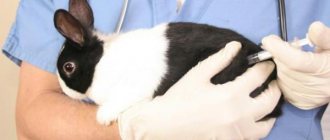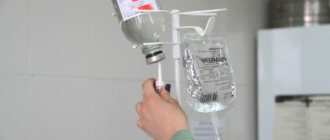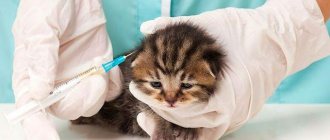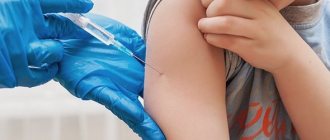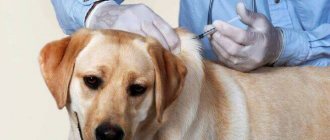What diseases are rabbits vaccinated against?
There are 3 mandatory injections, without which rabbits are not allowed to participate in exhibitions, competitions, transportation across the border, or mating. In addition, the chance of survival of unvaccinated babies is low.
Rabbits receive their mother's immunity at birth, absorbing immune cells with milk. After feeding, they remain defenseless against the outside world and infections. Often it is the immature young that die out.
The most dangerous disease is rabbit viral hemorrhagic disease (RVHD) . The virus appeared in the 1980s, presumably from the PRC. It is transmitted from rabbit to rabbit through contact, use of the same bedding, cages, bowls, even when walking on the same soil. The infection cannot be transmitted to humans.
The fur of infected rabbits is also dangerous; it is aired out for 3-4 months before sale (and demand and price drop by 2-3 times). Symptoms: mucus from the nose, lack of appetite, high fever, convulsions.
The most dangerous disease is rabbit viral hemorrhagic disease (RVHD)
Myxomatosis is an infection transmitted by contact by mosquitoes. Expressed by swelling of the mucous membranes, purulent conjunctivitis, painful neoplasms, tumors, blisters, crusts; secondary development of sexual problems.
It is transmitted and develops within a week. Unlike VGBK, cure is possible, but with a lightning-fast reaction to the first symptoms.
Myxomatosis
Rabies is a rare disease among rabbits, but it has been actively gaining popularity in recent years. Vaccination is mandatory for transporting pets.
The virus is dangerous for humans; a sick animal cannot be saved. Manifested by excessive salivation, aggressive behavior, epilepsy, photophobia.
Rabies
Preparation
In order to vaccinate correctly and not harm the animal, the following instructions should be followed:
- Vaccines are administered to a healthy animal. When sick and during the rehabilitation period, the animal’s body is weak. When an injection is administered, the risk of infection of the rabbit increases, since the immune system is not able to overcome the pathogen.
- Before vaccinating rabbits, you should carefully read the instructions. Drugs produced at different times may have differences in composition.
- Strictly follow the recommended dose. Exceeding it harms the animal’s body, and decreasing it does not create stable immunity.
- Follow the procedure for vaccination and do not deviate from the deadlines. The rabbit's body develops a defense mechanism only for a short time. Further, the likelihood of infection increases significantly.
- 7-14 days before vaccination it is necessary to carry out worm prevention.
- Before the first vaccination, the animal is weighed. Its weight should not be less than 500 g.
- You cannot purchase funds from unverified places. The pharmacy must have a certificate for medications. In addition, you need to check the deadlines.
- Since the vaccination of ornamental animals is carried out by a veterinarian, you should ask him to enter information about their implementation in the passport issued upon purchase of the animals.
See also How to treat rabbit hemorrhagic disease?
Now you can start vaccinating your rabbits.
Optional vaccines
The presence of these vaccinations is not stipulated in the charters of nurseries, organizations, and agricultural farms. But in order to avoid an epidemic among young rabbits, it is better to protect yourself with additional procedures.
Veterinarians recommend injections for the following diseases:
- Salmonellosis . A dangerous virus for all mammals, even humans. It is transmitted by contact through bedding, bowls, shoes, and soil. The infection kills the tissues of the pulmonary apparatus and digestive organs, manifesting itself in the form of diarrhea, acute poisoning, and nasal discharge.
- Listeriosis. An incurable disease characteristic of pregnant rabbits and young animals. Affects the central nervous system and is spread by rodents. Leads to paralysis, miscarriages, and stillbirths. Transmitted to humans.
- Pasteurellosis. The infection develops in the bodies of dead animals and is transmitted through the air through contaminated food. Causes redness of the mucous membranes, high fever, diarrhea, nasal discharge, and difficulty breathing.
Be sure to read:
How many days does a pregnant rabbit walk while bearing babies?
Salmonellosis
Attention! Although vaccinations for these diseases are not required, this does not make them any less contagious or dangerous. Mortality rates from salmonellosis are 90%.
Pasteurellosis
What do you need to know about vaccination?
A rabbit can get sick under any conditions: in a cage, pit, enclosure, etc. Both individuals bred for economic purposes and decorative pets are susceptible to various diseases. Rabbits that are especially at risk are:
- constantly eat dry grass (hay) or fresh greens;
- are in close proximity to other pets (dogs, hamsters, cats);
- often let out for walks outside;
- live near bodies of water;
- have been bitten by insects.
After the virus has entered the body and the rabbit gets sick, the pathogenic bacteria begins to adapt to the conditions and multiply.
It will take very little time for it to develop. Recognizing the infection is quite difficult. As a rule, a rabbit breeder determines that individuals are sick when the virus has fully adapted to the body and began to actively parasitize.
This is why veterinarians note that it is quite difficult to identify the first symptoms of diseases and nip them in the bud.
The greatest danger to pets is myctomatosis, an acute viral disease, and VGBV. The thing is that scientists have not yet developed drugs and treatments that will help rid the animal of these diseases. In other words, they are currently incurable.
To protect rabbits from such diseases, the only effective way is vaccination. Its action is aimed at preventing the development of the disease or easing its course if it does occur.
Please note that it is necessary for all pets to be vaccinated in a timely manner, otherwise an epidemic may begin on the farm and, as a result, mass death of animals.
Vaccination scheme
Depending on the age, procedures for vaccination and revaccination of rabbits are carried out alternately. For babies who have not gained the required weight, vaccination is postponed. WITH
The cost at the clinic is 200-400 rubles.
| Age | Vaccine | Route of administration and dose |
| 28-30 days | Myxomatosis | 1 cube intramuscularly |
| 1.5 months | VGBK | 0.5 cc intramuscularly |
| 3 months | Solikoks (against coccidiosis) | Per 1 kg 0.4 ml with food (2 days in a row) |
| 4 months (and every six months) | Myxomatosis (revaccine) | 1 cube intramuscularly |
| 4.5 months (and every six months) | VGBK (revaccine) | 0.5 cc intramuscularly |
| 6-7 months (and annually) | Rabies | As recommended by your veterinarian |
What vaccinations are necessary for rabbits and which ones are desirable?
At what age can you vaccinate?
Every animal, regardless of breed and type of breeding, must be vaccinated. Vaccination is one of the main ways to prevent such dangerous rabbit diseases as myxomatosis and rabbit viral hemorrhagic disease (hereinafter referred to as VHD), which cause great damage to farms.
It is important to know not only which vaccinations are given, but also when. This is an important aspect of vaccination. A lot depends on the age of the animal. Eared animals are known to be susceptible to stress. It is stressful situations that particularly affect rabbits that reduce their immunity. As we know, the vaccine contains weakened pathogens of a particular disease; immunity appears if the animal’s body copes with them. So, if the animal is weak, vaccination can only harm it. Rabbits should be vaccinated no earlier than the rabbit is 45 days old. If pets need emergency vaccination, it can be done at 3-4 weeks of life, but not earlier.
How often should rabbits be vaccinated is another popular question among rabbit breeders. Vaccinations should be done no more often than once every six months. And also focus on the nature of the disease. For example, myxomatosis is a disease that is transmitted by mosquitoes, fleas, and flies. We know that it is difficult to encounter mosquitoes and flies in the autumn-winter period, since they do not tolerate low temperatures. Therefore, in regions with a temperate continental climate, eared animals can be vaccinated against myxomatosis no more often than once a year.
Next, we will tell you what vaccinations are given to rabbits and explain the vaccination schedule, since if the schedule is not followed, there will be little benefit from vaccination.
Video “Vaccination of rabbits”
The video talks about vaccination: types of vaccines, methods of vaccination, nuances of the procedure.
Vaccination against myxomatosis
The myxomatosis virus is highly resistant and belongs to the myxomatosis family Poxviridae of the genus Leporipoxvirus. This virus was brought to Europe by the French scientist Armand Delisle, who more than 100 years ago, wanting to reduce the number of wild rabbits, developed this disease. The disease spread and mutated too quickly. Myxomatosis is dangerous because it has many vectors of spread - through mosquitoes and fleas, as well as through the air with dust.
Symptoms include swelling of the eyelids and eyes, high fever and apathy. The animal may die within 48 hours. Therefore, it is very important to get vaccinations on time, which are the only prevention against this disease.
Depending on what kind of vaccination is given to rabbits, there are certain rules that must be followed, otherwise it will be useless.
You need to adhere to a certain scheme for the vaccination to be effective:
- The first vaccination is given in the spring to rabbits aged 4 weeks;
- the next dose of the myxomatosis vaccine is given 28-30 days after the previous one;
- the third vaccination is done six months later (in the autumn).
Next, the animal must be vaccinated at least once a year or every six months, depending on climatic conditions. Remember that your pets must be healthy during the vaccination period.
From VGBK
Rabbit viral hemorrhagic disease is a very dangerous disease that is transmitted through sick animals (their feces), food, soil or through humans. Appears within 2-3 days after infection (less often 5 days). The animal loses its appetite, becomes apathetic, and its nervous system is disrupted. Capable of affecting absolutely all organs of rabbits (liver, heart, stomach, etc.). VGBK is a rapidly progressing disease.
Vaccination of rabbits against this disease is also done according to a clear scheme:
- baby rabbit is 45 days old - first vaccine;
- if the first injection was given against myxomatosis, then VGBK is given two weeks later, and vice versa;
- the next two are done with an interval of 14 days;
- re-vaccination is done every six months.
Other vaccinations
What vaccinations are given to rabbits, besides the ones listed above? We will also consider this issue in our article. There is a combination vaccine against myxomatosis and VHD, which is known as the associated vaccine. It will cost more, but in total it will be less hassle. It is done according to this scheme:
- a baby rabbit aged 45 days;
- The rabbit is given a permanent vaccination two months after the previous one;
- repeat every 6 months.
What additional vaccinations are given to rabbits? This is a vaccination against pasteurellosis. Vaccination must be carried out when the animal is 1-1.5 months old. Repeat it 2-3 times in the first year of life. How many times a year you need to repeat this vaccination depends on the drug you are using.
In what cases will the vaccine not work?
There are several conditions under which the vaccine will not be effective:
- the animal was infected before vaccination, and since the vaccine is not a medicine, it will not help your pet;
- an expired drug may also not work;
- non-compliance with vaccination conditions (schedules listed above);
- improper storage conditions of the drug;
- if the animal has not been treated against worms;
- sick individuals are vaccinated.
Complications are also possible when the vaccine is given to rabbits who are pregnant, or to rabbits that are too small and have not reached the age specified above. If the rabbit is pregnant and I give her an injection with the vaccine, premature birth may occur or the female will give birth to dead rabbits.
Therefore, it is necessary to take this procedure very seriously and not only follow the system by which vaccinations are given, but also check the expiration date and storage conditions of the ampoules. You can carry out this procedure yourself, or it can be performed by a veterinarian. Read carefully the vaccine instructions, how much you can inject at one time (dosage), as well as how a rabbit may react to the drug and what body reactions are normal for this procedure.
How to vaccinate yourself
Many breeders, in order to save money, carry out this procedure on their own, the main thing is that you must have experience and know how to vaccinate rabbits so as not to harm your pets.
Before vaccinating a rabbit, you need to carefully read the instructions and decide on the dosage, which should also be indicated on the medical certificate for the vaccine. Most of these drugs must be diluted with specially treated water (sold at a veterinary pharmacy) or formaldehyde solution. The injection is given to the animal at the withers or thigh. You need to hold the rabbit tightly so that it does not jump out.
If this is your first time performing this procedure, then most likely you will need an assistant to hold the animal. Remember that if you dilute the vaccine, its properties will only last up to three hours.
If you decide to carry out this procedure yourself, then 10 days before vaccinating the rabbit, you should give it anthelmintic drugs (tablets, drops). The animal must be completely healthy. By following the above recommendations, you can properly vaccinate your pets.
Video “Master class on rabbit vaccination”
In the video, a candidate of veterinary sciences demonstrates different methods of vaccinating rabbits.
hrunya.ru
Vaccines for rabbits
All funds are divided into two types, determined by the presence of active or dead strains of the virus. There are live vaccines - they contain fragments of an active infection, to which the body reacts violently, but quickly builds protection.
The second type is inactivated. They differ in composition: the strains are dead, the reaction in rabbits is hidden, immunity takes longer to establish, but also lasts longer.
Mono-vaccines
At the moment, they are considered ineffective, they consist of strains of one virus, which is why the animal has to be pricked several times. At first glance, the drugs seem cheaper than polyvaccines, but this does not take into account the purchase of additional mixtures. The technology of use differs in that the solvent is often water rather than a solution.
Be sure to read:
How to breed rabbits in a pit, housing conditions and cultivation details
Complex vaccines
Vaccination with preparations containing strains of more than one virus is more profitable. Such vaccines are divided into bivalent (2 infections) and polyvalent (over 3 viruses).
In Russia, the first type is popular, providing protection against VGBK, myxomatosis:
- “Lapimun Hemix” (manufacturer – Ukraine);
- "Rabbiwak V" (domestic production);
- "Pestorin Mormix" (Poland);
- "Nobivak Mixo" (Holland);
Important! Additional vaccines are also complex. The drug "OKZ" is often used for salmonellosis, klebsiosis, and colibacillosis.
Although several diseases are more difficult to control, associated vaccinations are more effective. Firstly, the animal does not need to endure several injections or experience stress.
Secondly, the possibility of side effects is half that of a single-component medicine.
Rabbit vaccination table
The two diseases for which vaccinations are mandatory are not the only ones. There are several other diseases that can affect animals, including pasteurellosis and salmonellosis, as well as rabies.
There is also a comprehensive vaccination against the first two, but they usually get vaccinated against rabies only in the case of recorded epidemics and when traveling to another country.
It is better to consult with your veterinarian about all the necessary vaccinations for your region. They always know whether there are epidemics, what threatens this season, and what will pass by.
How to vaccinate
Vaccinations are given intramuscularly. The most accessible and safe place is the rabbit's withers or thigh. You can vaccinate yourself or call a veterinarian to the farm.
The question is often asked: is it possible to vaccinate all rabbits with one syringe? This is not prohibited, but it is not recommended either. If you use 1 syringe, you need to at least change the needles. But in general it is better to refrain from such “savings”.
Remember, preventing a disease is cheaper than treating it. If one rabbit has some kind of disease during the incubation period, then when vaccinated with one syringe you can infect all the others.
Preparing for vaccination
The drugs do not work on already infected rabbits; animals must be absolutely healthy before vaccination. To make sure of this, the pets’ basal body temperature is measured every day for a week (the norm is no higher than 39.5 degrees).
A healthy rabbit has a good appetite. Discharge from the nose, diarrhea, painful appearance, and shortness of breath may alert you.
Within 2 weeks, rabbits are dewormed by administering anthelmintic drugs. These are suspensions or compressed tablets. If you have no experience with vaccination, it is better to go to a veterinary clinic, consult with a specialist, and choose the right dose based on weight.
Preparing the animal
Regardless of the type of vaccination, it is recommended to follow the following rules before carrying out the procedure:
- the rabbit must be absolutely healthy;
- when performing the manipulation yourself, you must strictly follow the instructions for the medicine;
- It is prohibited to change the dosage of a medication without a doctor’s testimony;
- it is important to strictly adhere to the vaccination schedule, otherwise the animal may become infected;
- before vaccination, it is worth giving the animals a substance against helminths for prevention;
- The first vaccination is permissible only if the animal’s weight exceeds 500 grams;
- the minimum interval between different vaccinations should be 2-3 weeks;
- When carrying out the procedure yourself, it is important to adhere to the rules for storing the medicine.
See also
Instructions for the associated vaccine for rabbits and how to vaccinateRead
To avoid adverse reactions to the vaccine, it is recommended to protect rabbits from stress factors and hypothermia, which worsen their immunity.
How to vaccinate rabbits yourself
Experienced breeders prefer to vaccinate their pets themselves; it is cheaper, and the rabbit does not need to be taken to the clinic (especially when a whole herd is being vaccinated). Before the procedure, you need to take care of the drug itself. Purchase it from veterinary pharmacies or clinics.
It is important to ask the seller for a certificate and check the expiration date.
Vaccinate strictly according to instructions. The dry powder is diluted (solvent - water) to make 0.5 ml. The needle of the insulin syringe is wiped with alcohol (used once), as is the puncture site.
It is better to inject into the thigh - intramuscularly, but subcutaneously is allowed - into the fold on the withers (the skin is pulled back). A specific place is not selected; it is impossible to harm the animal in this way. The required dose is injected and the area is wiped with alcohol.
Attention! An open drug is used within 3 hours, after which the expiration date expires and the vials are disposed of.
Quarantine – 14 days. At this time, it is important to limit contact with unvaccinated individuals, reduce the risks of mosquito bites, and the influence of the external environment (cold, heat).
Be sure to read:
The birth of rabbits and caring for them, what to feed a nursing rabbit
To improve the functioning of the immune system, vitamin supplements, immunostimulants, fish oil, pumpkin, sprouted grains, and rowan are introduced.
If you plan to transport your pet across the border or participate in exhibitions, 20 days must pass after the last procedure, but no more than six months (for mandatory vaccines). The schedule is tracked using the veterinary passport.
Efficacy and complications after vaccination
The instructions for using the vaccine for rabbits say that today it is an effective remedy for hypertension and myxomatosis. As stated earlier, it is intended to prevent infections, not to treat. That is why, before diluting an associated vaccine for rabbits, you need to make sure that they are no longer sick.
Of course, even if animals are vaccinated, this cannot provide a 100% guarantee that they will not get sick. However, the procedure forces the body to develop immunity to pathogens, due to which it can suppress their active reproduction.
The instructions for use for the associated vaccine for rabbits say that the vaccination is ineffective in the following cases:
- during the procedure the animal was weakened by worms or infections;
- there were an excessive number of pathogens, the immune system could not suppress them;
- a low-quality or expired vaccine was used, the revaccination schedule was violated;
- the animal was already suffering from VHD or myxomatosis when it was vaccinated.
Before diluting the associated vaccine for rabbits, you must carefully familiarize yourself with the possible complications. In most cases it is easily tolerated. Sometimes there may be a deterioration in appetite in the first days. In some cases, local reactions appear on the skin. They go away on their own without therapeutic measures.
Animals should be observed for 4-5 days after dosing. If it was infected at the time the injection was given, it will die after the specified time.
Expert opinion
Dobryshev Sergey Anatolievich
Professional rabbit breeder and hare breeder with 30 years of experience
Important! Within 4-5 days, it is necessary to provide better feeding and living conditions so that an initially healthy rabbit can more easily tolerate vaccination.
Vaccinations for pregnant rabbits
Doctors recommend vaccinating the female 2 weeks before mating. This way she will develop immunity to certain viruses, pass some of it on to future offspring, and the young will be born primarily protected. But vaccination during pregnancy in the absence of allergies is well tolerated.
Important! Vaccination is carried out at any stage of a rabbit’s life; the procedure is undesirable only during lactation (milk may turn sour, disappear or run out).
What vaccinations are given to rabbits: indications and age of the procedure
Rabbit breeding is an interesting activity, but quite troublesome. Unfortunately, already sick rabbits are practically untreatable, which ultimately leads to death. All rabbits must be vaccinated, regardless of breed or living conditions. The same vaccinations are given to both decorative pets and outdoor animals. Common walks outside, insect bites and feeding on fresh grass can lead to dangerous diseases.
What infections are rabbits vaccinated against and at what age?
The mandatory vaccination plan includes vaccinations against myxomatosis, rabbit viral hemorrhagic disease (RVHD), and rabies. These are the most common diseases in these animals. You can become infected with them anywhere: through contact with carriers (mice and rats), from flea and mosquito bites, and when using dirty equipment. The danger is that if at least one rabbit from the entire population gets sick, then very soon all the animals will die.
It is necessary to vaccinate rabbits of both decorative and meat breeds.
Attention. Vaccination is not carried out if the animal is weakened after illness or transportation, is exhausted, or is not gaining weight well.
So, when is the first vaccination given? Little rabbits develop immunity during the period of feeding with mother's milk. It will remain for another month after the babies are weaned from the rabbit. During this time, the rabbits need to develop their own defenses in the body. Therefore, they are given the first vaccination at the age of 1.5-2 months, when they reach a weight of 500 grams. In epidemiologically disadvantaged regions, it is better to give the first injection a month after birth and repeat it after 3 months. Adult animals are vaccinated at least 2 times a year.
Two weeks before vaccination, deworming must be carried out. The rabbit must be absolutely healthy, with a body temperature between 38.5-39.5 degrees. It is worth paying attention to the color of urine and feces, general condition, coat color, discharge from the eyes and nose.
Important. The VGBV vaccine is recommended every 9 months.
The vaccination scheme and schedule are developed by the owner himself. This takes into account the timing of the evacuation of small rabbits from their mother, the age at which the animal is allowed to be slaughtered, etc. The scheme is adjusted due to the emergence of epidemic sources in the region.
Adult animals are vaccinated at least 2 times a year.
It will be more convenient for novice rabbit breeders to use a complex vaccine (against myxomatosis and VGBV). It is usually used in the spring, and then, as necessary, grafted with monovalent drugs. It is advisable to inject monovaccines into rabbits immediately after purchasing them. After vaccination, the animals are quarantined for two weeks. Vaccination is not carried out during the winter period.
Vaccination for rabbits against myxomatosis
Myxomatosis is an extremely dangerous infectious disease. This virus was developed in France more than 100 years ago to control the growing population of wild rabbits. But the disease mutated and instantly spread to domestic animals. Transmitted by airborne droplets and insect bites.
The first signs of infection are:
- purulent conjunctivitis;
- fever:
- swelling;
- apathy;
- tumor nodes on the body.
All sick animals die within 2 days from the moment of infection. The only way to avoid the disease is vaccination with Rabbivac V.
When is the best time to get vaccinated:
- the first time it is carried out at 4 weeks of age (preferably in the spring);
- it is recommended to do the second one a month later;
- the third time - six months later (in the fall).
The first time rabbits are vaccinated against myxomatosis is at 4 weeks.
In the future, rabbits are vaccinated 2 times a year - in early spring and autumn.
Vaccination against VGBK
Rabbit viral hemorrhagic disease (distemper) is considered one of the most terrible infections. It is transmitted through the feces of infected animals and even through soil. The incubation period of the disease lasts from 1 to 3 days.
Symptoms of the disease:
- loss of appetite;
- drowsiness and apathy;
- convulsions;
- nervous system disorders;
- moans.
The disease causes congestion in the lungs and liver, extensive hemorrhages. After a few days, the sick animal dies. There is no cure for VGBV. Only timely vaccination can help.
The first VGBV vaccination is administered to a rabbit at the age of 1.5 months. If an injection for myxomatosis was previously given, then it is necessary to maintain an interval between them of two weeks. The next dose of the drug is administered after three months. Next - six months later. If the rabbits still died a few days after vaccination, it means they were already infected with the virus.
The first VGBV vaccination is administered to a rabbit at the age of 1.5 months.
Rabies vaccination
Rabies is practically never found among rabbits. However, if a rabbit is attacked by a sick animal, it will die within a week. The virus enters the bloodstream through bites and saliva.
The first signs of the disease are:
- changes in behavior;
- profuse drooling;
- refusal of water.
Only decorative pets that often travel with their owner on an airplane or train are vaccinated against rabies. The vaccine is common to all pets. The first injection is carried out at the age of 2-2.5 months. In the future – once a year. If you plan to take the rabbit somewhere, then vaccination is done a month before the trip.
Complex vaccination
The most common complex vaccination is myxomatosis + VGBK. The vaccine is associated, i.e. one package contains 2 bottles of medicine that must be mixed before use. Rabbits need to be pricked 1.5 months after birth. The drug can be administered subcutaneously, intradermally and intramuscularly. After three months, revaccination is carried out. It is possible to vaccinate pregnant rabbits with a complex vaccine, but it is not worthwhile to vaccinate nursing rabbits.
The most common complex vaccination is myxomatosis + VGBK.
Optional vaccines
Rabbits are often infected with pasteurellosis, salmonellosis (paratyphoid) and listeriosis. It is up to the veterinarian to decide whether to vaccinate against these diseases.
Symptoms of pasteurellosis:
- fever;
- lacrimation;
- a sharp increase in temperature.
Pasteurellosis is more common in large farms where the animals are not well cared for. The first injection is given at the age of 1-1.5 months. In the first year of life, 2 or 3 more revaccinations are carried out. Further, it is recommended to prick rabbits every six months.
Signs of salmonellosis:
- diarrhea;
- severe vomiting;
- refusal to eat.
Vaccination is done according to the same scheme as for pasteurellosis, with a difference between them of at least 2 weeks.
Listeriosis primarily affects females. They stop eating, become lethargic and apathetic. A complex vaccination can be used against all three diseases. A vaccination schedule can be developed by a doctor.
Vaccination of pregnant and lactating rabbits
It is not advisable to vaccinate pregnant females. If such a need arises, then it is better to get vaccinated at a short period, long before giving birth. Lactating females should absolutely not be vaccinated.
It is not recommended to vaccinate pregnant and lactating females.
It is known that immunity in rabbits is developed by consuming mother's milk. Therefore, it is better to wait a little and vaccinate already stronger babies. To avoid unpleasant consequences, it is better to vaccinate females one and a half weeks before mating. In this case, the body will have time to form antibodies to the disease.
How to vaccinate yourself
Before administering the drug at home, you need to purchase the medicine, carefully study the instructions, and prepare a special insulin syringe. Most vaccines are made in the form of dry mixtures that are diluted with distilled water. The prepared liquid cannot be stored for longer than three hours. The injection is made intramuscularly, into the thigh, after first securing the rabbit well. One dose of the medicine is 0.5 ml.
15 minutes after the vaccine is administered, the following symptoms may appear:
- weakness;
- redness and swelling of the mucous membranes;
- skin rashes;
- salivation;
- dyspnea.
These are signs of an allergic reaction. You can administer an antihistamine, no more than 0.3 cc. If symptoms persist after this, you should consult a doctor.
The vaccine is administered intramuscularly to the rabbit, and the animal must be held tightly.
When vaccination is useless
There are several reasons when the vaccine does not have the required effect:
- the rabbit was infected even before the vaccination was administered;
- the vaccination schedule was not followed;
- no preliminary deworming of the animal was carried out;
- an expired drug was administered;
- The vaccine was given to a sick or weakened rabbit.
The vaccination will take place without complications and will give the desired effect if you strictly adhere to the vaccination schedule, use freshly prepared preparations and inject only healthy animals.
We offer you to watch a visual video instruction on how to properly vaccinate rabbits.
ferma-nasele.ru
Side effects from vaccination
Due to the partial death of rabbits after vaccination, owners refuse to vaccinate animals in order to avoid the extinction of the herd.
Such a reaction is possible if an uncertified vaccine is purchased, the expiration date expires, the ampoules are depressurized, the drug is improperly stored, or due to the fault of the owner:
- incorrect dosage selection;
- non-sterile devices;
- lack of preparation before the procedure;
- administering the mixture to sick pets;
- presence of mosquitoes, ectoparasites;
- delay in revaccination.
After correct mandatory vaccination, there are no side symptoms, unless the eared animals have an allergy or hypersensitivity to the drugs.
Within 48 hours after the injection, swelling, swelling, and enlarged lymph nodes are observed. You need to monitor the condition of the rabbits for 15-20 days; if other effects occur, contact a veterinarian.
Effectiveness of vaccination
Vaccinations are an effective way to fight diseases. However, they do not always help. Complex vaccinations for rabbits and monovaccines do not protect in the following cases:
- Late holding . Any vaccine needs time for the body to learn to produce antibodies (immunity). If infection has already occurred, there is no point in vaccinating a sick individual. It is still advisable to vaccinate healthy animals.
- Errors during preparation or during the procedure. For example, effectiveness decreases when more than a few hours have passed after the vaccine is diluted. Sometimes the drug is stored incorrectly, the expiration date has expired, or there are other irregularities.
- No vaccination is 100% guaranteed . It is important to constantly maintain the immunity of animals. It is influenced by conditions of detention, dietary habits, etc.
